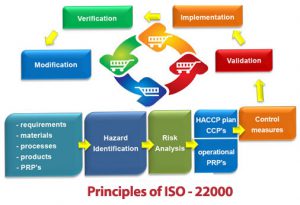AKAP Accreditation Organization

$380.00 – $420.00Price range: $380.00 through $420.00


Further details
ISO 22000 (Food Safety Management System) is a globally accepted international standard, which specifies the requirements for food safety management systems. ISO 22000 is applicable to all organizations involved in the food chain, whose main objective is to ensure food safety. The standard outlines a framework which harmonizes all parts of the food supply chain, from producer to consumer, and helps you reduce food hazards, control the risks and prevent contamination.
Food Safety Management has become the headline of many articles worldwide and if businesses choose to ignore it, they will have you bear the consequences. By obtaining an ISO22000 certification, you will prove your commitment to food safety and adherence to respective food safety regulations.
By obtaining an ISO22000 certification, you will prove your dedication to food safety to your customers and stakeholders. Moreover, you will gain a worldwide recognized certification on Food Safety Management, where you will learn all the processes and policies needed to mitigate risks and enhance accountability and transparency. This will, in turn, will you a competitive advantage by improving your brand’s reputation and leading to potential increases in business volume.
By becoming ISO 22000 certified you will be able to:
Whatever their size, or product, all food producers have a responsibility to manage the safety of their products and the well-being of their consumers. That’s why ISO 22000 exists.
The consequences of unsafe food can be serious. ISO’s food safety management standards help organizations identify and control food safety hazards, at the same time as working together with other ISO management standards, such as ISO 9001. Applicable to all types of producer, ISO 22000 (Food Safety Management System) provides a layer of reassurance within the global food supply chain, helping products cross borders and bringing people food that they can trust.
ISO 22000 is the International Food Safety standard, designed to harmonize on a global scale the requirements for food safety management for businesses within the food chain.
ISO 22000 (Food Safety Management System) combines and supplements the core elements of ISO 9001 and HACCP to provide an effective framework for the development, implementation, monitoring and continual improvement of a documented Food Safety Management System (FSMS) within the context of the organization’s overall business risks.
ISO 22000 (Food Safety Management System) certification is intended for organizations seeking to establish a more focused, coherent and integrated FSMS than is normally required by law. The standard requires meeting any applicable food safety related statutory and regulatory criteria into its food safety system.
The ISO 22000 (Food Safety Management System) standard establishes requirements for organizations to ensure that the provided food production is free from any contamination. Contaminants in this standard are divided into three types of microbial, chemical and physical.

Benefits of ISO implementation:
– Increase customer and consumer confidence
– Increasing the quality of products/services
– Reduce waste and losses in products/services and ultimately reduce costs
– Save on consumables and increase profits
– Planning, implementation of affairs in the form of a predefined international system
– Improve performance, increase productivity and speed in affairs
– Increase efficiency and customer satisfaction
– Reducing the number of complaints
– Improvement and uniformity in the quality of products/services
– Timely delivery of products/services
– Global competition
– Prevent or reduce unexpected events
– Earning points in tenders, obtaining ranks and grades from government organizations, providing evidence in exports
Other benefits are:
– Advertising use in headers, company site and all advertising matters
– Earn points in selecting sample units
– Reduce waste and waste time
– Creating confidence inside and outside the organization
– Transparency of processes and indicators
– Ensuring that customer needs and expectations are met
– Production of product/service with better quality
– Help with more marketing and sales and create demand
– Increasing the productivity and motivation of human resources
– Correcting errors and preventing their recurrence
– Improving communication within the organization
– Prevention of non-compliant product/service production
– Develop sales methods and provide after-sales service
$420.00 – $460.00Price range: $420.00 through $460.00
$380.00 – $420.00Price range: $380.00 through $420.00
$380.00 – $430.00Price range: $380.00 through $430.00
$500.00 – $530.00Price range: $500.00 through $530.00
$320.00 – $350.00Price range: $320.00 through $350.00